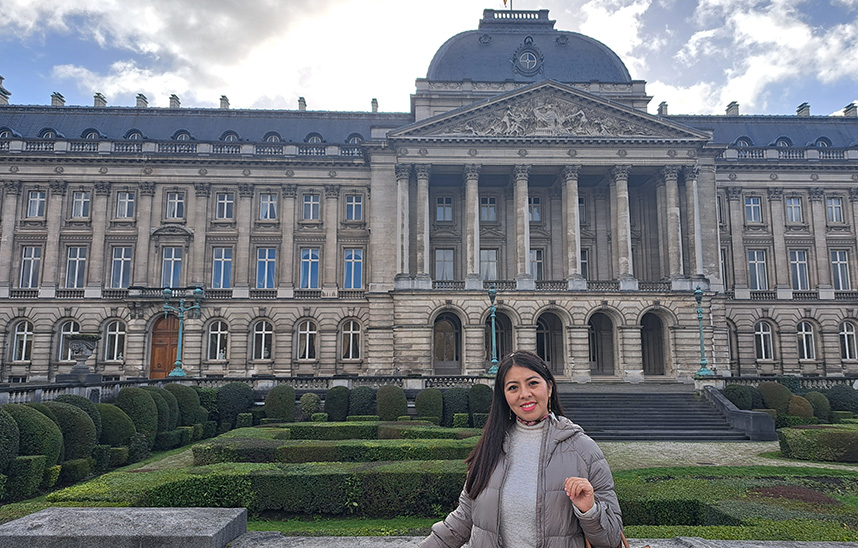A researcher from the ICS visit the Brussels to deepen in analysis techniques of speech and analyze discourses of gender violence.
ICS predoctoral researcher Maria Cristina Bastidas, has made a stay at the Free University of Brussels in the framework of his doctoral thesis

PhotoCEDIDA/CristinaBastidas has worked at the Centre de Recherche en Sciences de l'Information et de la Communication during her stay
María Cristina Bastidas, predoctoral researcher of the group 'Vínculos, creatividad y cultura' (Links, creativity and culture) of the Institute for Culture and Society (ICS) of the University of Navarra, has made a research stay from February to April 2023 at the Free University of Brussels to contrast data and train in practical methods of analysis of speech and interpretation of data in the framework of her doctoral thesis 'speech, narratives and identity in contexts of gender violence. Analysis and lines of intervention in Latin American women in Navarra'.
Specifically, the doctoral student was assigned to the Centre de Recherche en Sciences de l'Information et de la Communication (ReSIC), a center specializing in programs of study communication. There she worked under the tutelage of Jan Zienkowski, an expert in the analysis of speech, professor at department of Information and Communication Sciences and former researcher of the ICS.
According to the researcher, the stay has allowed her to increase her knowledge on the multidisciplinarity on issues of analysis of the speech and to know the different theoretical an d methodological approaches to interpret the results obtained so far in her . data obtained so far in her research.
Together with Zienkowski, the doctoral candidate was able to "open spaces for dialogue so that other members of ReSIC could comment on or discuss my proposal". As she has recounted, this has broadened her view on thesis , by contrasting with other lines of argument to "recognize vulnerabilities in order to strengthen research". In addition, he had the opportunity to work with the Deputy Director of the Master's Degree of Communication, David Domingo, with whom Bastidas was able to talk "at length to expand information and learning".
A thesis of real life experiences
The work of research of the doctoral student "is an interdisciplinary study that will allow us to approach specific stories told by their protagonists to understand from their experience a real problem," says the researcher, with special emphasis on the fact that these are real experiences of violence.
In order to obtain the results to work with, Bastidas has carried out an "exhaustive" fieldwork work . According to the doctoral student: "It is not easy to approach migrant women living in Navarre who have suffered some subject of humiliation and are willing to tell about it".
Subsequently, she pooled all the stories in order to identify common and differential aspects through their structure. From these, data seeks to analyze how the interviewees can "create a meaningful experience in which their identityis expressed," says Bastidas. On the one hand, the microstructure of the narratives is studied in relation to each particular story and, on the other hand, the macrostructure in which elements common to all the stories can be found. This way of studying the narratives and finding their relationship through pragmatic-linguistic categories is part of the learning that Bastidas has achieved after her stay: "We want to look for patterns or common behaviors in the reading they make of their own story staff expressed orally, to recognize the way they understand themselves and what their stories can reveal to us about partner violence".
Bastidas considers that it is very necessary to contribute knowledge to a subject social problem as complex as intimate partner violence. "The causality of my work can range from the fact that I am a foreign woman, to the immense need to shed light on a topic such as intimate partner violence experienced by women who are possibly exposed to greater vulnerabilities due to a different idiosyncrasy". Women from Latin America in Navarra, like her, are the protagonists of her work.
